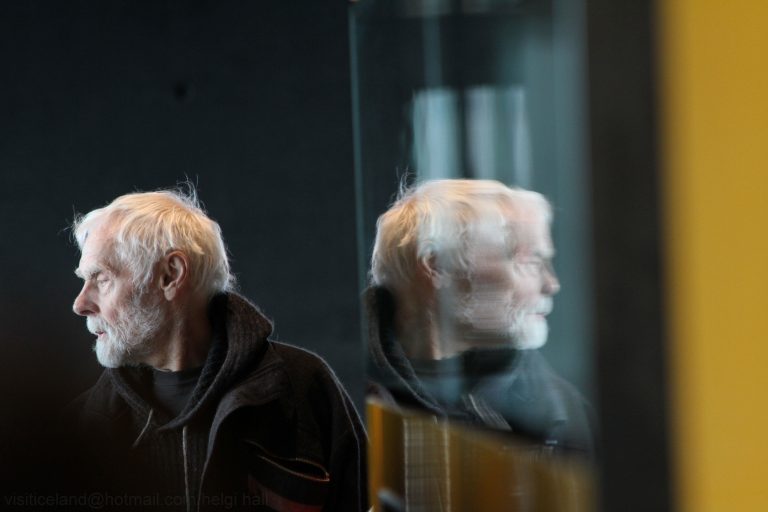
Dr. SAS Kargbo at the Aspen Ideas Festival. Image by John Cary.
Small Acts of Life-Saving Grace: The Little-Known Story of Samuel Kargbo of Sierra Leone
I mostly resist hero worship. I don’t think it makes any of us smarter. Usually, there are strategies that underlie what we deem exceptional, strategies that don’t require superhuman intelligence or courage to deploy. When we create heroes, we floodlight one person; when we examine the insights and behaviors that make them appear heroic, we make the whole world brighter.
Having said that, it’s hard not to fit a halo around Dr. Samuel Kargbo, known by his friends and colleagues as SAS. I met him last week at the Aspen Institute’s Spotlight Health Conference and I knew within minutes that I was in the presence of greatness. Not the kind of greatness that shows up in the form of long, award-filled CVs, though SAS has one of those (he is an Aspen New Voices fellow, which is why I met him). Nor does it show up in the form of fancy, fast-talking analysis about “metrics” and “scaling for impact;” SAS knows that world, but he’s not really of it.
No, this is the kind of greatness that hides behind stories told in a humble, plain way. It’s the kind of greatness that makes you pause and go, “Wait, did he just say what I think he said?” It’s the kind of greatness that is born, not of big ideas, but of small acts of grace and responsibility.
When Ebola hit Sierra Leone like a tidal wave, SAS — a trained medical doctor — was focused on lowering maternal and child mortality in his country. Through that work, he’d met and collaborated with many tribal chiefs, and as such, he felt compelled to go to one of them as the outbreak continued to worsen and pay his respects (the chief had lost both his wife and daughter). In fact, almost everyone in the village had lost someone.
When SAS arrived, the giant of a man that he’d known previously seemed to have shrunk with grief. He wore all black, as did most of the elders that sat around the circle. His eyes filled with tears as he described what he and his tribe had been through, not just the loss of their loved ones to such a lethal disease, but the indignity of not being able to bury their beloved because of the health risks of doing so. It was a double death.
SAS could see it from both sides. On the one hand, he knew how much his people valued their elaborate burial process; he had been a part of many such burials, some of which take as much as two months to complete. On the other hand, he knew that the medical community wasn’t being unnecessarily insensitive as they took Ebola victims away and kept the corpses in isolation; they were trying to save those that were still alive from an unusually predatory infectious disease. Washing the bodies of the dead, an important tribal tradition, was killing people left and right.
A lesser person might listen to such a stand off and shake his head, but SAS was convinced they could wade through the grief and the mandates and find some strange, but satisfying middle ground. He refused to believe that ritual and protocol were mutually exclusive, that mandated quarantine necessarily meant religious intolerance. He asked: “Why don’t we train a few of your tribal leaders in safe infectious disease practices, and then some of your people can represent the village while providing a modified form of the usual rituals for the dead?”
The chief agreed, and so did the health workers that SAS spoke to about the intricacies of the burial practices. It would, after all, keep everyone safer if the community didn’t feel tempted to track down their beloveds’ bodies and go ahead with the traditional practices despite warnings from authorities. Soon, tribal community members were suiting up in the protective gear alongside nurses and doctors, and working together to honor the dead and keep the living safe and with some sense of spiritual integrity amid such devastating loss.

Once SAS had brokered this new understanding and middle-ground strategy, he was eager to do it in more places. People were dying everyday. So he went to his “boss,” the Chief Medical Officer and requested to be assigned to become the head of burials in Sierra Leone.
When he told me this, it was as if he were reciting his grocery list. It was my moment of “Wait, did he just say what I think he said?” Here was a man who not only demonstrated a rare and life-saving capacity to translate between people who didn’t share the same values, though arguably the same ultimate goal, but now he was asking to be put in the most challenging possible position of leadership in the midst of absolute crisis. When I tried to probe him about this decision, he looked at me like I was speaking Mandarin. “What else would I do?” he asked. “I had an idea for how to make things better.”
Many believe that SAS’s insight was one of the key moments that turned the tide of the Ebola epidemic in Sierra Leone. In other words, his quiet, relational wisdom, his commitment to collaboration across religious and ethnic differences, his courage to take responsibility for his own gifts and insights, saved tens of thousands, if not hundreds of thousands of lives.
You can see why I have trouble resisting my own resolve to avoid hagiography when it comes to SAS. This big bear of a man, his smile wide and his sense of humor intact, is the embodiment of wise duty.


Share your reflection